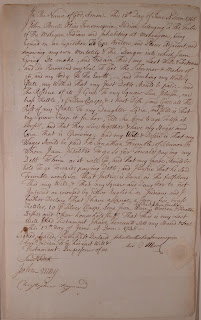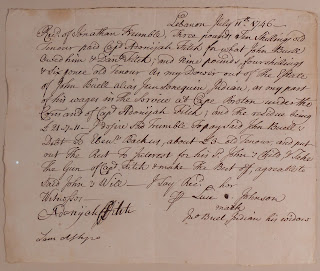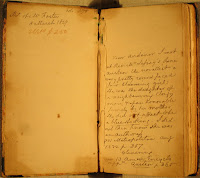 This past week we acquired two related manuscripts that speak volumes: the Last Will and Testament of John Buell of the Mohegan tribe, dated July 12, 1745, and the execution of his estate from July 11, 1746. In July of 1745 Buell had just become a part of Captain Adonijah Fitch's company in King George's War. He was among the many members of the Mohegan tribe to join the English in the French and Indian wars. These documents are a witness to the uncertainty of his fate as he headed from Connecticut to Cape Breton.
This past week we acquired two related manuscripts that speak volumes: the Last Will and Testament of John Buell of the Mohegan tribe, dated July 12, 1745, and the execution of his estate from July 11, 1746. In July of 1745 Buell had just become a part of Captain Adonijah Fitch's company in King George's War. He was among the many members of the Mohegan tribe to join the English in the French and Indian wars. These documents are a witness to the uncertainty of his fate as he headed from Connecticut to Cape Breton. There are a lot of ways to look at Buell's Will. It shows the influence of European colonial law on tribal culture, especially for a "Christianized" Indian. It also documents one Mohegan's worldly possessions and debts as well as his thoughts on their distribution upon his death. He splits his estate between his "squaw Luce Johnson" and his daughter Lydia, while asking for their protection in a troubled time.
 But there is a curious addition. The wages he is about to earn as a member of Fitch's unit are to go toward his debts to Jonathan Trumble, and it is Trumble who signed off on the final disposition of the estate. This calls into question the motivation for joining the war and writing his Will. Was he forced into the military to help pay his debts? Or, was the Will written at the self-interested insistence of Jonathan Trumble who wanted to ensure any money Buell earned would go first to pay his debts? Or, should we take it on face value? He says his Will is written "knowing my own Mortality & The Danger into which I am Going."
But there is a curious addition. The wages he is about to earn as a member of Fitch's unit are to go toward his debts to Jonathan Trumble, and it is Trumble who signed off on the final disposition of the estate. This calls into question the motivation for joining the war and writing his Will. Was he forced into the military to help pay his debts? Or, was the Will written at the self-interested insistence of Jonathan Trumble who wanted to ensure any money Buell earned would go first to pay his debts? Or, should we take it on face value? He says his Will is written "knowing my own Mortality & The Danger into which I am Going."The documents are now here in Rauner and open for research use. We would love to know more about John, Luce, and Lydia Buell and Jonathan Trumble.


